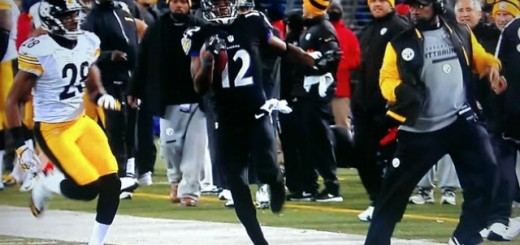Tweet
Minutes before the start of Day 2 of the NFL Draft, the league and its fan base were rocked with the breaking report that Cleveland Browns superstar wide receiver Josh Gordon was being suspended indefinitely for violating the league’s substance abuse policy. The violation is presumed to be marijuana related. From Gordon to ex-Giants safety Will Hill to Cardinals linebacker Daryl Washington, it certainly doesn’t require a sixth sense to detect a problematic reality: NFL players like the green. And I’m not just echoing Rod Tidwell’s “show me the money” sentiment.
The latest instance in a maddening trend of herb indulging players being denied the gridiron has launched a debate about the league’s marijuana restrictions. Should the NFL test for and punish the use of marijuana by its athletes? Does the cost-benefit analysis of the current policies offer a net positive to the league?
NFL’s Substance Abuse Policy
The cornerstone of the NFL’s substance abuse policy is the Intervention Program, which embodies the set of rules and procedures that allows the league to test for illegal and over the counter drugs. Built into the program is a series of three intervention stages, creatively named “Stage One,” and so on. Each stage describes testing procedures and punishments that escalate in severity, and a player smokes, drinks, swallows or snorts himself into the next stage with each failed drug test. To the league’s credit, players are evaluated by medical advisors, who establish custom treatment plans designed to best serve that player’s interests.
Josh Gordon is reported to have been in Stage Three of the Intervention Program at the time of his latest failed test, which includes a refusal or missed test. Under the terms of the policy, the player remains in Stage Three for the rest of his career, and is subject to up to a whopping 10 tests per month. Oh Josh… you must’ve seen this coming. Any violation of the policy, including failure to cooperate with testing or treatment procedures, subjects a Stage Three player to a minimum one calendar year suspension. Interestingly, a one-year banishment pursuant to Stage Three will toll the player’s contract. A substantial silver lining for the Dog Pound in this case.
Policy Reform Needed?
“Substance abuse can lead to on-the-field injuries, to alienation of the fans, to diminished job performance, and to personal hardship. The deaths of several NFL players have demonstrated the potentially tragic consequences of substance abuse. NFL players should not by their conduct suggest that substance abuse is either acceptable or safe.”- NFL Substance Abuse Policy.
The above-stated, explicit purpose of the policy helps set the stage for meaningful debate as to whether marijuana should continue receiving an invitation to the league’s testing and punishment party. Does Josh Gordon’s weed smoking increase his risk of injury? His fantasy owners will be the first to tell you that it sure doesn’t seem to negatively impact his performance. Do recent legislative developments offer evidence that the general public accepts marijuana use to the point that fan alienation is a nonissue? Reasonable people believe and argue that marijuana use, to a substantial degree, is both acceptable and safe, especially when compared to other commonly used substances.
Any analysis of rules reform in the context of sports must begin with a look at its impact on competitive balance. Would “decriminalizing” marijuana use among NFL athletes either help or hinder the on-field performance of players who smoke? It’s not HGH, anabolic steroids or amphetamines. It’s marijuana. There is no basis for argument that it serves as a performance enhancer (pain suppression tendencies aside), and we also can’t presume that herb indulgence would lead to a corresponding decrease in quality of play. If we generally trust that players won’t throw back a couple stiff jack and cokes before kickoff, it would follow that we should exercise the same trust that players won’t pass a pregame bong around the locker room.
In the midst of all the legal hoopla surrounding concussions, a spotlight has been placed on player safety. However, if you’re looking to go the “unsafe” route to argue in support of marijuana’s inclusion in the drug policy, I’ll point you in the direction of alternative drugs that players may rely on to get through a season. Playing in the NFL is a physically taxing endeavor that punishes your body. Talk to a person who takes a daily swim in a pool of pain, and they will tell you that smoking weed offers a nice floating device. Marijuana is seen as a healthier alternative to the grocery list of painkillers introduced to the body by pill or injection, which has the potential to damage the body’s organs. It also offers a temporary escape from the stress of life in the limelight, which reduces the need for alternative anxiety medication.
Perhaps the most compelling anti-marijuana in the NFL argument is one grounded in business theory. The league’s image is its baby, and preserving that image is to preserve its value in the eyes of current and potential corporate sponsors. But how much would corporate America care if the league ceased its testing for marijuana? As a general statement, CEO’s values mirror those of the majority public, and there is plenty of research that shows that the public is increasingly comfortable with the existence of marijuana in our society.
According to an April 2013 article, 38% of American adults had tried smoking marijuana in 2003. That number inched forward to 40% in 2011, and skyrocketed to 48% in 2013. The same article claims that men, who represent the majority of the NFL’s fan base, are even more likely to have tried marijuana (54%). The fact that Colorado and Washington have taken the plunge to legalize marijuana, with other states expected to follow suit in the coming years, serves to both validate and perpetuate the notion that weed use is infiltrating our society as a normal activity, akin to alcohol consumption.
Also, if the detection of THC in a player’s system no longer subjected that player to a suspension, the league would no longer be in the news alongside the word “marijuana.” Only when a suspension is handed down to a player like Josh Gordon does the association between the green and the NFL enter the public’s consciousness.
Reportedly, the threshold for a positive marijuana test will soon be increased, and related punishments will be reduced. This change will reflect and respect the growing pile of medical and societal information becoming available. The league will naturally strive to capture some form of concession from the NFL Player’s Association in exchange for softening their stance, but it seems as though some reform is imminent.
Like most issues in life, this one is cloaked with shades of grey. What is clear is that enough holes can be punched through the drug policy as currently constituted to support the exploration of options to reduce penalties in the near future. As I type these words, I envision that somewhere Josh Gordon is nodding eagerly in agreement.



Recent Comments